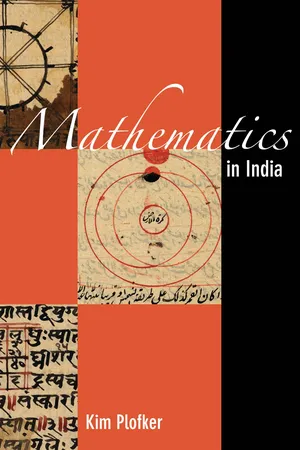
Mathematics in India
Kim Plofker
- 360 Seiten
- English
- ePUB (handyfreundlich)
- Über iOS und Android verfügbar
Mathematics in India
Kim Plofker
Über dieses Buch
Based on extensive research in Sanskrit sources, Mathematics in India chronicles the development of mathematical techniques and texts in South Asia from antiquity to the early modern period. Kim Plofker reexamines the few facts about Indian mathematics that have become common knowledge--such as the Indian origin of Arabic numerals--and she sets them in a larger textual and cultural framework. The book details aspects of the subject that have been largely passed over in the past, including the relationships between Indian mathematics and astronomy, and their cross-fertilizations with Islamic scientific traditions. Plofker shows that Indian mathematics appears not as a disconnected set of discoveries, but as a lively, diverse, yet strongly unified discipline, intimately linked to other Indian forms of learning.
Far more than in other areas of the history of mathematics, the literature on Indian mathematics reveals huge discrepancies between what researchers generally agree on and what general readers pick up from popular ideas. This book explains with candor the chief controversies causing these discrepancies--both the flaws in many popular claims, and the uncertainties underlying many scholarly conclusions. Supplementing the main narrative are biographical resources for dozens of Indian mathematicians; a guide to key features of Sanskrit for the non-Indologist; and illustrations of manuscripts, inscriptions, and artifacts. Mathematics in India provides a rich and complex understanding of the Indian mathematical tradition.
**Author's note: The concept of "computational positivism" in Indian mathematical science, mentioned on p. 120, is due to Prof. Roddam Narasimha and is explored in more detail in some of his works, including "The Indian half of Needham's question: some thoughts on axioms, models, algorithms, and computational positivism" ( Interdisciplinary Science Reviews 28, 2003, 1-13).
Häufig gestellte Fragen
Information
Inhaltsverzeichnis
- Cover
- Title Page
- Copyright
- Contents
- Preface
- List of Abbreviations
- Chapter One - Introduction
- Chapter Two - Mathematical Thought in Vedic India
- Chapter Three - Mathematical Traces in the Early Classical Period
- Chapter Four - The Mathematical Universe Astronomy and Computation in the First Millennium
- Chapter Five - The Genre of Medieval Mathematics
- Chapter Six - The Development of “Canonical” Mathematics
- Chapter Seven: The School of Mādhava in Kerala
- Chapter Eight - Exchanges with the Islamic World
- Chapter Nine - Continuity and Changes in the Modern Period
- Appendix A - Some Basic Features of Sanskrit Language and Literature
- Appendix B - Biographical Data on Indian Mathematicians
- Bibliography
- Index